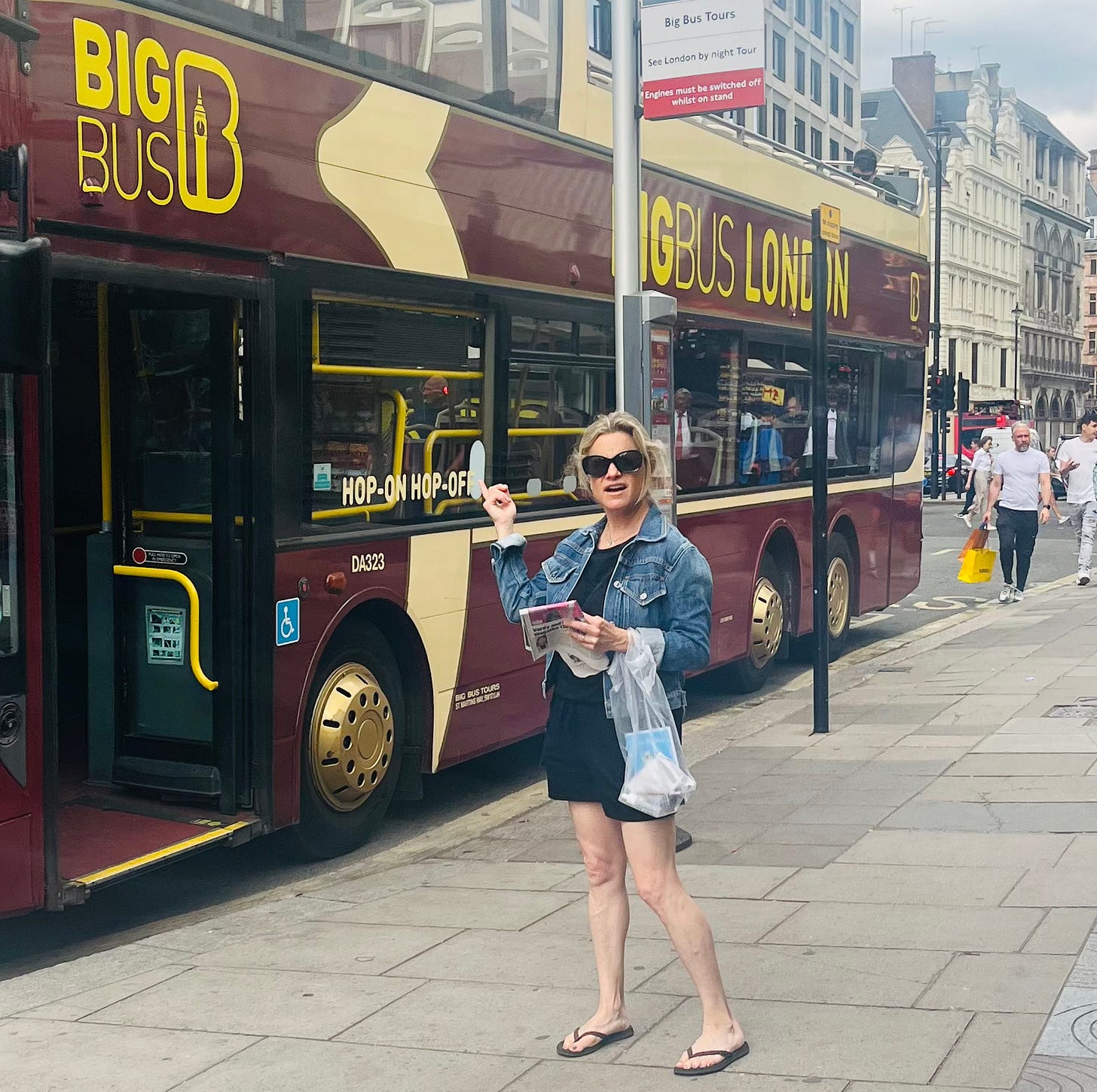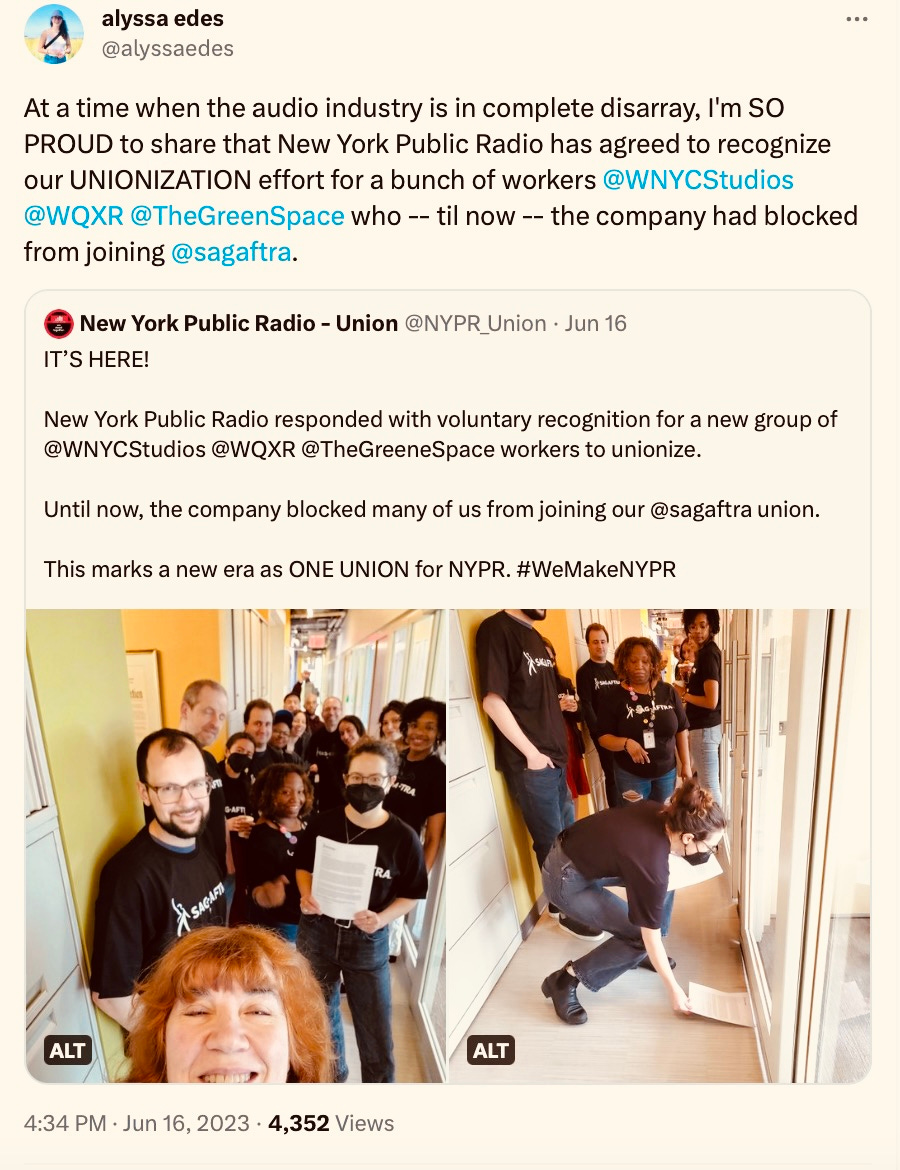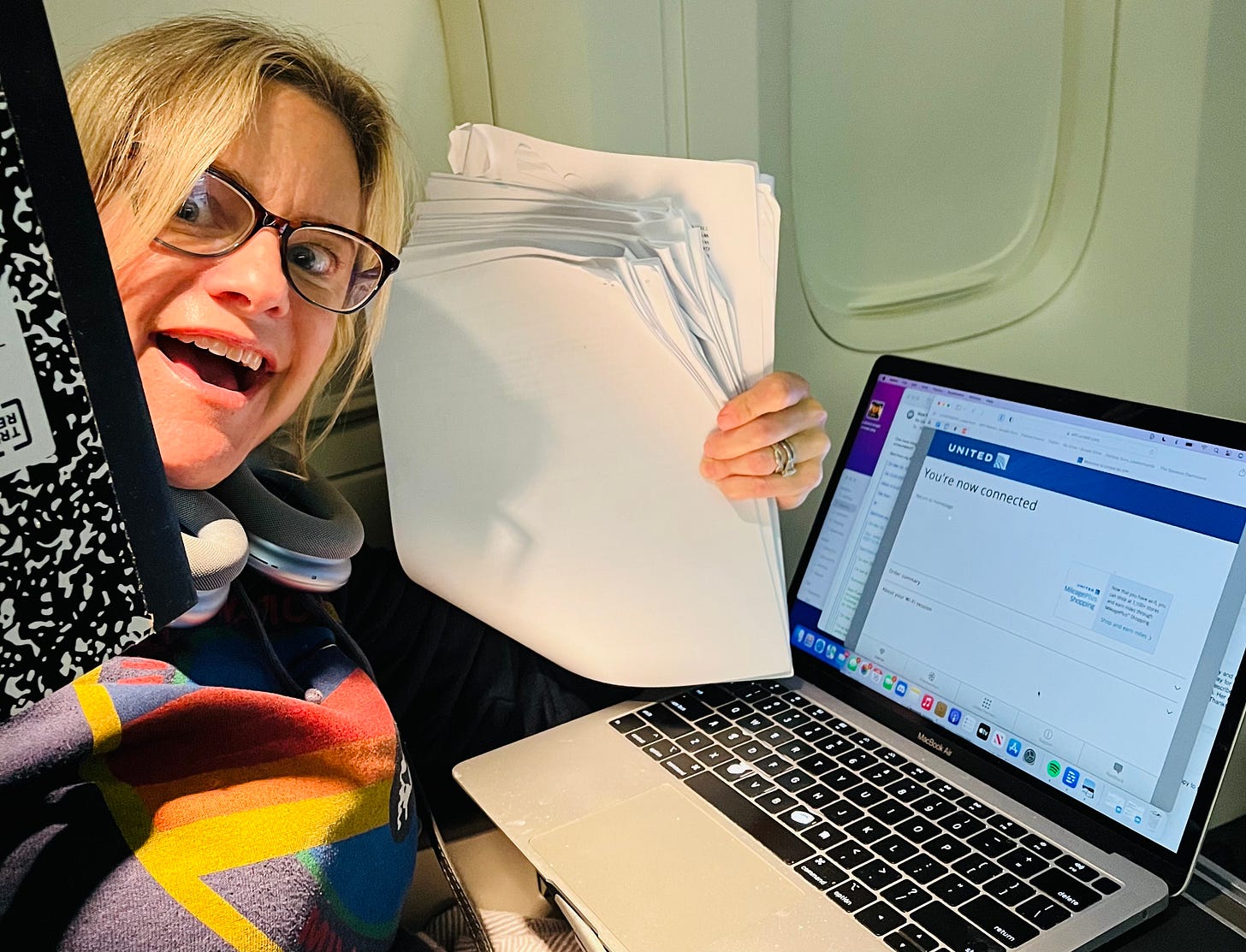More on WNYC Studios and An Announcement
Plus: Bad News from LAist; Good News from the NYPR Union
Greetings from the UK!
I’m in London on a family vacation that was originally supposed to take place in 2020 (yeah, not great timing!).
I’ll be honest: I tried to get you part three of my series before I left, but new sources came forward and I wanted to give them all a chance to speak before I put the final pieces together.
And so, alas, I didn’t make my deadline!
And now I am trying to be an actual human person who spends time with her husband and children!
So forgive me, but you’ll have to wait just a bit longer for part three of my series on WNYC (part one is here and part two is here).
That said, I have good news!
Whilst I finalize my reporting, my friend Eve Batey will be filling in for me with two reported stories about the world of podcasts (paid subscribers, witness your money at work!). Those of you who have followed my writing since my years at Inside Podcasting might remember Batey as my colleague from Inside Media, but she was also a co-founder of SFist, the deputy managing editor at the San Francisco Chronicle, and an editor for Eater San Francisco. Currently she co-edits the terrific true crime review and analysis journal Best Evidence, hosts a podcast called The Docket, and freelances for places like Vanity Fair.
Before I let you go, let’s briefly address:
Bad news from LAist;
Good news from NYPR union;
A few more thoughts on WNYC Studios.
(Btw if you want to hear me butcher a British accent whilst discussing podcasts, I filled in for Sam Sethi as James Cridland’s co-host on last week’s episode of Podnews Weekly Review and it was a bloody good time! James, I am practicing! Invite me back and I promise to impress!)
LAist (formerly KPCC) has laid off 10% of their staff.
About six weeks ago, I tried to speak with someone at LAist about the station’s radio/digital merger (KPCC acquired LAist in 2018; the combined entities have been rebranded as LAist). I explained that I was reporting on WNYC’s integration with Gothamist and was looking for insights from executives at other institutions who had embarked on a similar journey. Initially I was told that the station’s VP of Podcasts would be “happy to chat,” but after a PR rep was added to the email chain, the station executive ghosted me. After last week’s announcement, the silence makes more sense.
Executives are blaming the layoffs on a “revenue shortfall,” but it also appears that the cutbacks are in service of addressing — surprise! — the threat of digital media. In an article about the news in LAist, CEO Herb Scannell is quoted as saying “more and more folks are getting news online … We need to figure out a way to develop [more online] loyalty.” Hmmm.
Let me be clear: of course public radio stations should leverage digital media. This is a no-brainer. What scares me though, is that “developing a digital strategy” often becomes “digital before anything else” which then becomes “run away from the thing we do best, the thing that sets us apart, and the thing that brings in all the money (!!).” (Note, this is a spoiler for part three.)
But good luck with that, Herb!
My heart goes out to everyone who was laid off.
And now for some good news from the NYPR Union:
Congratulations to all involved.
A Few More Thoughts on WNYC Studios
After I published part two of the WNYC series (in case you’re a new subscriber, please read part one first), a couple of sources reached out to say that there is one show Golis can take credit for developing: The Experiment, a podcast “about people navigating our country's contradictions” made in partnership with The Atlantic. I hadn’t mentioned The Experiment because it was canceled after 15 months and part two focused on Golis’s accomplishments, rather than his failed attempts (for more on his failures though, check out this other piece I wrote last March). But perhaps characterizing The Experiment as a failure isn’t fair; it was a good show (I was a fan), and if Golis brokered the deal that made it happen and helped develop the concept behind it, he deserves credit for that.
….On the other hand (sorry, not sorry), I’m left wondering why the partnership with The Atlantic didn’t last. Was the decision out of Golis’s hands? There are a number of other WNYC Studios podcasts that have ended without a satisfying explanation over the past four years. For example, in 2020, Andrew Golis announced a second season of Come Through with Rebecca Carroll, but it just…never materialized. A WNYC PR rep blamed the show’s end on the departure of its host, but sources told me that Carroll didn’t feel supported by Golis. Who is to blame? Carroll, for leaving? Or WNYC for failing to keep talent onboard? I can’t say for sure (and as I like to remind readers, I don’t want to be sued), but what I can say is that the drumbeat of departures and cancellations under Golis’s watch have added up. According to my reporting, WNYC Studios has lost or cancelled at least 15 shows over the past four years.
I am not the only one who has taken notice of WNYC Studios’ declining portfolio numbers. About a week ago, public radio veteran and Magnificent Noise co-founder Eric Nuzum published an analysis of four years of audience data from Podtrac’s list of Top Publishers in his excellent newsletter The Audio Insurgent. Nuzum tracked data from April of 2019 to April of 2023; here’s an excerpt from his newsletter that explains the central reason he chose this period of time:
2019 is just a really good reference point for podcasting. It was before the pandemic. It was the same year that mega acquisitions, partnerships, and investments really took off and seemed to happen every few weeks. It was our “let’s pour gasoline on this fire” moment–and it is good to see what we got out of all that infusion of money, resources, and talent.
The results illustrate that over the course of those four years — a timeframe that maps almost perfectly to Golis’s tenure at WNYC — public radio’s podcast audience numbers returned to pre-pandemic levels or sunk even lower, while numbers for commercial outfits like iHeart and Wondery increased dramatically. Of course, Nuzum was looking at public radio broadly — not just WNYC. However, the results of Nuzum’s analysis, which included data from four major public radio institutions, exposes WNYC Studios as the worst performer in the bunch, with a whopping 33% decrease in monthly listeners and a 17% dip in monthly downloads. PRX is next in line, with a 20% decrease in monthly listeners and a monthly download number that stayed flat.
Check out this live graph Nuzum created:
Compare the above with how Podtrac’s Top Ten podcast publishers performed during the same time period:
According to Nuzum, the reason for the difference between public radio’s podcast performances and commercial performance is straightforward:
Commercial publishers place a lot of bets and place a lot of new shows out into the world. It has driven a lot of their download growth. In this period, iHeart increased their portfolio of shows by almost 500%, while Wondery more than tripled their number of shows. … The four public radio organizations among the Top Publishers have not offered new programs at anywhere near a similar clip.
The lack of innovation at WNYC is particularly striking when weighed against the fact that in 2015, a New York Public Radio press release announcing WNYC Studios promised that the institution would raise $15 million dollars to create “a revolving fund” that would “seed new projects and use revenue from successful projects to incubate additional shows.” According to the announcement, two million dollars of that fund was already in place, and a source with knowledge told me that the remaining $13 million was also raised. (A PR spokesperson has not responded for my requests for comment on this point.)
Even more fascinating — in a time capsule kind of way — is this quote from then-NYPR-CEO Laura Walker within the press release:
Traditional media businesses have been threatened by digital media, but that’s not the case here … We fully embrace podcasting and on-demand audio. Furthermore, we believe that narrative audio has to continue to evolve to stay relevant, and we are looking forward to leading the way.
Everyone else is worried about digital, but not us!
My, how things have changed.
When I reached out to WNYC for comment, I was told that “given the saturation of the increasingly competitive podcast market, the strategic focus of WNYC Studios in recent years has been supporting and growing its existing always-on shows and teams, and elevating internal talent.”
So WNYC decided to slow their roll because the market had become competitive? As Nuzum wrote in his piece, 2019 was a time of massive industry growth, “our ‘let’s pour gasoline on this fire’ moment.” How did WNYC get from “leading the way” to “let’s just hunker down on our existing portfolio”? What happened to the station’s pioneering spirit? What happened to its willingness to take risks? What happened to all that money?
That’s it for me this week. Next up, an article or two from Eve Batey, and then part three of my series in which we’ll take a deep dive into the WNYC newsroom.
Have a great weekend.
Skye
Postscript. Working hard to get this newsletter done on the plane!







My local Pittsburgh independent stations are in trouble -- WYEP is a great music station, WESA is the NPR station -- operated by one entity, PCBC. PCBC has waded into podcasting over the years but have never capitalized on it. Management says costs are going up but cutting their outrageous compensation is never considered. The three PCBC positions:
Key Employees and Officers Compensation
TERENCE O'REILLY (PRESIDENT AND CEO) $289,400
JOHN SUTTON (VP, AUDIENCES AND REVENUE) $197,810
CHRISTOPHER CAPATO (VP, FINANCE AND ADMINISTRA) $150,974
COURTNAE TURKO (SENIOR VICE PRESIDENT) $119,699
CINDI LASH (VP, NEWS) $95,422
https://triblive.com/business/programming-changes-could-be-coming-to-wesa-wyep-radio-during-challenging-times/
"Everyone is worried about digital but not us!" Didn't Kendall Roy say that?